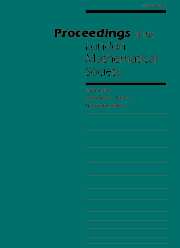Article contents
Duality for general Lipschitz classes and applications
Published online by Cambridge University Press: 01 July 1997
Abstract
As shown by the author in {\em Proc.\ Amer.\ Math.\ Soc.} 115 (1992) 345–352, for every metric space $(K,d)$ with compact closed balls one has $(\mbox{lip}\,\varphi(K))^{**} = \mbox{Lip} \,\varphi (K),$ where $\varphi$ is any majorant (that is, non-decreasing function on ${\Bbb R}_+$ with $\varphi (0+) = \varphi (0) = 0$) such that $\varphi(t)/t$ monotonically tends to $+\infty$ as $t\rightarrow 0.$ Here $\mbox{Lip}\,\varphi(K)$ is the Lipschitz space on $K$ with respect to the metric $\varphi(d),\ \mbox{lip}\,\varphi(K)$ is the corresponding ’little‘ Lipschitz space of functions vanishing ’at infinity‘, and ’=‘ means ’canonically isometrically isomorphic‘. The main idea of the proof consisted of finding a normed space $M$ such that $M^* = \mbox{Lip}\,\varphi(K)$ and $M^c = (\mbox{lip}\,\varphi(K))^*,$ where ’$c$‘ stands for the completion, and identifying $M$ with the space of Borel measures on $K$ equipped with the Kantorovich norm. In the present paper, this argument is carried over to generalized Lipschitz spaces on ${\Bbb R}^n$ defined in terms of higher order differences. For an integer $k$ and for a majorant $\varphi$ with $\lim_{t \rightarrow 0}\varphi(t)/t ^k = +\infty,$ define $\Lambda ^k_\varphi$ to be the space of all bounded functions $f$ on ${\Bbb R}^n$ such that for some constant $C,\ \omega_k(f\,;t) \leq C\varphi(t)$ for all $t\geq 0$, where $\omega_k(f\,;\cdot)$ is the $k$th modulus of continuity of $f$. Let $\lambda ^k_\varphi$ be the (closed linear separable) subspace in $\Lambda ^k_\varphi$ which consists of functions $f$ vanishing at ’infinity' and such that $\lim_{t \rightarrow 0}\omega _k(f\,; t)/\varphi (t) = 0.$ We introduce an appropriate analogue $\Vert \cdot \Vert_{k,\varphi}$ of the Kantorovich norm on the space $M$ of finite Borel measures on ${\Bbb R}^n$ with compact support. The properties of this norm for $k \geq 2$ are significantly different from those of the Kantorovich norm ($k = 1$) which reflects the difference in analytic nature of generalized Lipschitz spaces versus classical ones. However, the core of the duality theory survives, and it is shown that $(M, \Vert\cdot \Vert _{k, \varphi})^* = \Lambda ^k _\varphi,\ \ (M, \Vert \cdot \Vert _{k,\varphi})^c = (\lambda ^k _\varphi)^*$ and consequently, $(\lambda ^k _\varphi )^{**} = \Lambda ^k _\varphi$. Several applications of these results are discussed, and a few open problems are formulated.
1991 Mathematics Subject Classification: 46E15, 46E35.
Keywords
- Type
- Research Article
- Information
- Copyright
- London Mathematical Society 1997
- 4
- Cited by




